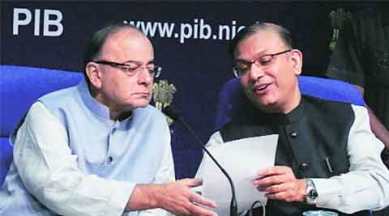Government interference to be checked: ‘Indradhanush’ to counter bad loans, revamp PSBs
Plan includes setting up of a Bank Board Bureau for board-level appointments

To improve the efficiency and functioning of public sector banks (PSBs) and reduce their bad loans, the government on Friday announced a comprehensive seven-point framework called ‘Indradhanush’ that included setting up a Bank Board Bureau and a holding company for government equity.
The government also announced appointment of managing director and CEOs of five state run lenders as well as non-executive chairmen at five PSBs, which include private sector inductees.
These include of appointment of Ravi Venkatesan, former Microsoft India chairman and independent director, Infosys as non-executive chairman of Bank of Baroda and TN Manoharan, director, Tech Mahindra Public Health Foundation as non-executive chairman of Canara Bank. Meanwhile, former Citibank consumer banking head PS Jayakumar, who now heads VBHC Value Homes, has been appointed as MD and CEO of Bank of Baroda.
[related-post]
“PSBs play a very important role in the economy, however, they are facing a challenging situation over since few years. The government has been reviewing the health of banks from time to time and believes there is no cause for panic since issues are capable of being fixed,” said finance minister Arun Jaitley, adding that efforts are on to discuss restructuring of discoms with some states. He also stressed that the government would not interfere in the working of PSBs. “Since the present government took over, our policy was that commercial decisions must be taken on commercial considerations and the level of political interference in the functioning of banks have to be minimised.”
Minister of state for finance Jayant Sinha termed the PSB revamp as “the most comprehensive plan since nationalisation of banks in 1969” and said it would be a bottom-up transformation allowing banks and their boards to take decisions on consolidation and mergers. The Bank Board Bureau, which is expected to start functioning from April 2016 would replace the appointments board for selection of wholetime directors and non-executive chairmen at PSBs. Announced in the Budget, the Bureau would be headed by chairman and six members. The bureau would include three official members — financial services secretary, executive director, RBI and secretary, department of public enterprises apart from three experts of which at least two would be from the banking sector.
A search committee led by Reserve Bank of India Governor Raghuram Rajan would soon begin the selection for the Bank Board Bureau. However, the Bureau would be an “interim arrangement” and Jaitley announced plans to set up a holding company which will hold all the government stakes in banks and may take over some of the government’s current role in their management.
For 2015-16, of the Rs 25,000 crore allocation, the government has also finalised plans to allocate Rs 20,088 crore to 13 banks including Rs 5,531 crore to SBI and Rs 2,455 crore to Bank of India. The remaining Rs 5,000 crore would be allotted on the basis of performance. “The total requirement of extra capital for the banks for the next four years is likely to be about Rs 1,80,000 crore, to ensure there is a safe buffer over the Basel III norms,” said financial services secretary Hasmukh Adhia. Meanwhile, the government also announced plans to de-stress PSBs, particularly for lending to sectors such as power, steel, roads and sugar.
The ministry has also worked out a new criteria for reviewing performance of state run lenders based on which it would allocate performance linked capital infusion as well as performance linked bonus to CEOs and MDs of these lenders. To attract talent for banks, it announced plans to give ESOPs to top management of PSBs and said these lenders could soon be allowed to hire middle management from the private sector.